Arturia is celebrating their 20th year in business. That's a lot to be proud of for any business, but Arturia should be especially proud of the fact that in their 20 years of business, they have gone from being an early-entry software instrument company, to a diversified and fast growing hardware and software company.
The primary person responsible for this is co-founder and president, Frederic Brun, who, along with his partner, Gilles Pommereuil, founded the company in 1999 in Grenoble, France, best known to some of us as a haven for winter sports, and the host of the 1968 Winter Olympics. However because of its large number of universities, labs, and other technical resources, Grenoble has become the Silicon Valley of France.
We interviewed Frederic in 2011, as the company's transition to being a software hardware company was beginning. Arturia and Frederic have come a long, long way since. Their latest product MicroFreak is a bold departure from the norm. Not only is it extremely lightweight, and inexpensive, but it has a PCB keyboard, reflecting Arturia's imagination, style, and the manufacturing expertise they have now developed.
Arturia went from being a software company to being a software/hardware company. What changed?
We started with Origin back in 2004, and took longer than we expected really to make it happen. This is where we learned what being a hardware manufacturer meant. It's very challenging and retrospectively was more difficult than being a software developer.
And riskier, too...
Risky, exactly. The finance, and everything that has to go with it. The years we developed Origin, back in 2004 to 2008, were really tough, but eventually the product went out and we learned a lot. At the same time, we had the opportunity to create our first controller keyboard, which was Analog Factory Experience, before Origin. Those two helped us change the organization of the company.
Analog Factory Experience: https://youtu.be/p61sjhS-uig
At the time was there someone in the company who was a mechanical designer or electrical engineer? Or is that part of your own background?
No, it's not really part of my background. I was a Physical Chemistry Engineer at first. We hired people to help with that. There's a strong engineering culture in Grenoble, so we could find contractors, employees, interns and a retired ex-industrial manager, who helped us understand the value of every step in the chain. It took us a few years to get really what being a manufacturer is, which is different again from software. It was quite a challenge.
Grenoble is similar to Silicon Valley in the US. Why is that?
It is in some respect. There are a lot of universities. A lot of laboratories as well. A lot of very innovative companies started there or moved there. We had the European arm of Hewlett Packard for a long time there, they even made computers in Grenoble back then. ST Micro. Xerox. Now Apple has started something here. In fact, Forbes ranked Grenoble the fifth most innovative city in the world.
Were you doing the manufacturing in Grenoble as well?
No, and that was one of the problems. In Europe in the '90s a lot of the large telephone companies were making PCBs and assembly in smaller plants. In the '00s they started selling them to smaller companies that were consolidating plants of this sort.
So, we were working with one of these companies that had bought factories from telecom companies and were consolidating. They moved us from one factory to the other just to help their organization, which did not help us. We grew with experience, and had to handle a few situations, but eventually we started working with Chinese companies and that turned out to be easier.
Over 20 years of doing business, what are the most important things that you have learned?
I've learned to change myself, in order to get the company to change. I've learned to let go of certain things and be more light on certain topics; to trust more people and give them space so they can grow themselves. I'm always surprised at how effective this is and how that works. The hardest thing has been changing me. In the end, managers are the main potential source of slow down. The company can only grow as much as you grow personally.
In terms of strategy, I've had a hard time refraining myself from doing too many things. As you see, we do interfaces now, software, hardware synthesizers, analog, etc. This is who we are, we want to tackle new challenges, we find energy in making new things. Perhaps it does not make it easy for everyone to understand what we stand for in the market. Ableton for me is a great example of a company which is very focused, with a very understandable vision. At Arturia, we have this appetite for things and the need for a new venture to happen, for regular innovations.
What have you discovered about yourself?
I think tenacity. I don't know where it comes from—probably from childhood like so many things. Maybe it's related to stress, or the need to do things. It's the fight against time also. To achieve things, to make sure they happen early enough, before it's too late. For sure, it has some influence on what we're doing in the company. We're hard working and projecting ourselves.
You mentioned that you almost went bankrupt, in the Origin development. The tenacity, I imagine, got you through that. Did you have to borrow money?
Yea, we borrowed money. We also had a venture capital in the company whose stock we bought back two years ago. To build a company, stay independent and, at the same time, grow, there are some efforts to make for sure. You see that more easily after the journey.
With so many projects, do you have a process for development? How do you prioritize things?
Yes, we do. I've got a team of managers all in different areas like IT, R&D, software development, manufacturing, product management, marketing, sales—and all together, we are a group that's working well. A lot still comes back to me, and that's probably the most tiring, and at the same time dangerous thing for the company.
Part of what I'm doing is being the guardian of the company's values, providing motivation, setting directions. Being demanding is one of the things that I'm probably good at, but it's not something that I like to do. It's just in my nature. I can't just accept certain things. It's too painful.
But you must be enjoying it...
Yeah! It's exciting. There are moments where you feel it's a lot to do all of this, and I have four kids now. We also need to develop further in the USA, and Asia as well. Since I don't have necessarily someone who will do that with me, I feel like am I going to do all the traveling and deal with the jetlag, and this is where I consider the options, try to find shortcuts, and think "what would I do if I were smarter?"
Do any of your kids have an interest in the company?
Yea, especially my third. He saw me years ago hardly sleeping some nights, and he wanted to help. So, he started drawing instruments and he's collecting all of the catalogs, and when he comes to the office, he loves it.
He's got all those instruments, and he loves the Christmas parties at the office. For him, it's just enjoyable. He's really into it.
Some designs
That must make you feel pretty good.
It does.
How has your competition changed from when you started as a software company 20 years ago? What are the biggest differences from your strategic point of view?
It's a very good question. I think when I started, people were still in doubt that software instruments could help them make music, and there were only a few products on the market. There was a line of software instruments called Koblo from Denmark. There was a French guy doing a product called Virtual Wave. It was the very early days where they were selling CD-ROMs in boxes at music stores. Native Instruments were getting started, and so were we.
The challenge was to say, "look, we can make music using the computer as an instrument, not only as a recorder." I remember when I showed our first software instrument, the Moog Modular V, to Bob Moog. He was asking how many voices we had, and he was very surprised to see how we could do so much with the computer.
That was the first challenge. Look, it's feasible and it's going to allow you to work in a different way. It's going to be less expensive, and easier to integrate.
Now, it's a different thing. It's really about the workflow and the experience, and making sure that technology is not in the way. It's more a means than a problem. So, I think a lot of our thought now deal with making it right in terms of design and workflow. It's getting even more important than sound. People have understood that you can do many things, integration between the computer, the controllers, and software. It's about what you've got to do now, and how we can make it happen so it's really flawless.
What I hear you saying is that in the early days the competition was really about educating people. And nowadays it's about helping them be more productive.
Yes, and integrating in their existing environment. It's not, "come to us and check what we can do on the computer." We come to you, and we hide the technology. It's still there helping you do new things and do them where you want to do them. So, maybe on stage, or by the pool, or on a plane or whatever. Wherever and however you want to make music, let's make it happen.
In fact it's a general trend in pretty much every domain. Years ago, you had to go to a restaurant. Now you can call DoorDash or something. If you wanted to go running, you had to go to the stadium. Now you just put your sneakers on and run anywhere you want. So, the world is coming to you when we used to go to the world. It's the same for us. We have to bring the musician a creative environment wherever they are.
Let's talk about MicroFreak. The keyboard is a PCB? Where did that concept come from? It's not exactly "in the box" thinking.
I think we found inspiration in some of the instruments made by Don Buchla, but they are quite esoteric and rare. We thought that it could be interesting to bring this interface to a new generation of musicians, many of whom aren't "traditional" keyboard players. In a sense, this PCB keybed is a bit less intimidating. It's also about the expressiveness being more important than playing a melody. You can play chords, we've got the sequencer. If you want to play a melody you can, but that's not its focus. It's not necessarily for the keyboardist, it's more for everyone else who is ready to embrace a keyboard synthesizer without being able to play the keyboard.
It's got a short keybed, just 25 keys. You can play your chords, arpeggios, program sequences, and the sequences are fun because they can contain four different parameters. You can switch patterns on the fly. We added things like the Spice and Dice which add exciting controlled randomness, and even if you're not a keyboardist, it's still fun to use. All in all, it's a less intimidating approach with this keyboard I think, and it sounds great too.
And the PCBs pick up velocity?
Yes, velocity and Polyphonic Aftertouch. It's done by flattening your finger on a key broadening the surface. I was very worried that it wouldn't work well for the user. I was afraid they would find it hard to operate, or convoluted somehow, but I have been very, very happy to see that musicians are using it and the reaction has been really positive.
How have users reacted to the PCB keybed so far?
Very well. This PCB keybed is very playable. In the context of a small synthesizer like the MicroFreak it's perfect for 98% of your needs, and lets you explore things like polyphonic aftertouch that would be really hard to do with classic keys.
You guys have done a lot to support modular synthesists. Where do you think it's going at this point?
With our Step line, we've been the first and are still pretty much the only one supporting modular instrumentalists with keyboards offering more than simple USB. What we are looking to do is bridge the gap between analog and digital, so you have USB but also CVs on KeyStep or BeatStep Pro; We are also bridging a gap between production and performance, you use the Steps in production but can go on stage and can completely avoid using a computer if you want to.
That's been working very well for us. BeatStep, KeyStep, BeatStep Pro are not expensive, they are easy to use and easy to integrate into your setup. That gave us a strong position and a good direction for the next products, which are the MiniBrute and MiniBrute 2S. In addition, we have RackBrutes and the Link system where everything is integrated. A musician can go on stage using this solution and get started easily.
In terms of where the industry is heading, I think what musicians and regular users will want is more natural, gesture control. This is something we very much want to do. We feel that technology should really help people make music, but not at the cost of commoditizing music. This is a risk, because today it's easy to do certain things quickly, typically over the Internet. Eventually everyone does the same thing or triggers the same samples, etc. We must stay demanding with what we bring.
This is what we see as important right now for instruments. It's not only the sound, it's everything. It's the experience, and the process of simple integration with instruments, computers, and the musicians themselves. In the end, it's just about being empowered. I think this is the direction we will take. We're seeing this already with very cool digital based modules, and we'll see more solutions that crossover, I'm sure.
With modulars there's more improvisation going on, but it's not traditional instrument improvisation. It's kind of a performance in itself, and also the tactile part that computers don't have.
Exactly. This is the answer to your other MicroFreak question about the keypad. It's about experimentation and happy accidents, serendipity. Let's say you want to do something with the keyboard or retrieve your sequence, Spice, Dice, this is something you'll find on the interface, to add a level of uncertainty.
Notes on MicroFreak from the author (not to be confused with a product review).
I was personally excited about this product the moment I saw it at Winter NAMM in January. I can't claim to be an expert on synthesis, and I'm a guitar player to boot, but always excited about a bold product that is also fun. I immediately ordered one, and was not disappointed when it arrived.
From the beginning Arturia has maintained a healthy attention to detail and a positive customer experience. The attractively designed box included a minimum start-up (very green) manual, reg card, MIDI two 1/8" MIDI connectors, and a power supply, which you don't need if you have a USB port available.
They call the MicroFreak a paraphonic 4-Voice semi-modular synth. It's a combination of wavetable and digital oscillators, analog filters, and a highly flexible modulation matrix. It's small package, very light weight (2.5 lb), and affordable price ($299 street) belie a very powerful and useful feature set. Because it's USB bus powered you can even use it as a MIDI controller. There are a number of Oscillator modes such as Texturer, KarplusStrong, Harmonic OSC, and Superwave. There's even an onboard sequencer/arpeggiator.
The unusual keyboard could cause a real keyboard player to alter their technique a bit, but for me, it was an easy pick up, and, due its touch sensitivity and Polyphonic Aftertouch, highly expressive. Even the ribbon controller is unique.
I now own four synthesizers; my original Oberheim Xpander from 1984, a Roland MKS-50 from 1986, my Sequential OB6 from 2016, and this...
We at KVR congratulate Arturia and wish them the best of luck in the next 20 years.
Gilles Pommereuil, Frederic, and Maxenxe Brun designing the next 20 years
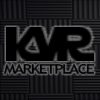
Find Analog Lab Pro, ARP 2600 V3, B-3 V2, Buchla Easel V, Clavinet V and more in the KVR Marketplace


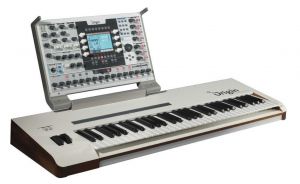

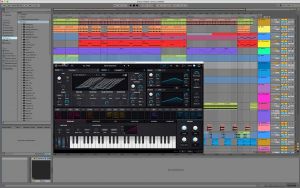

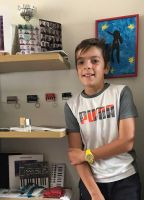
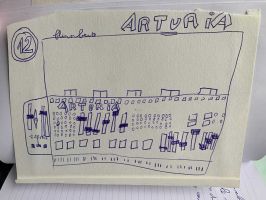
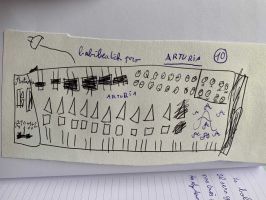
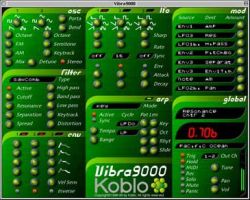
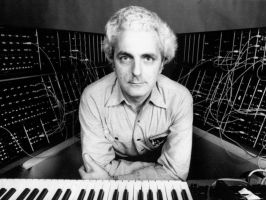
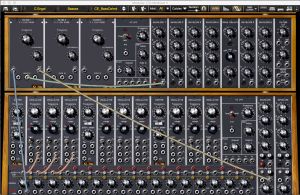
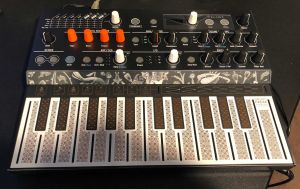
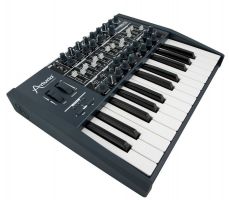
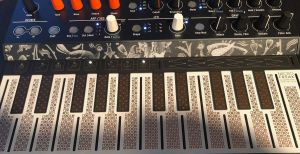
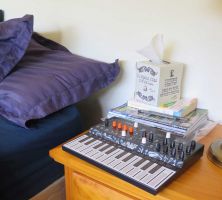
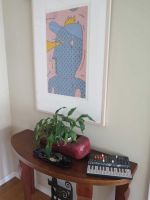

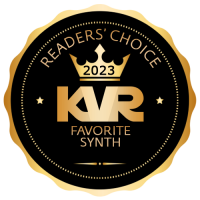

 Other Related News
Other Related News











